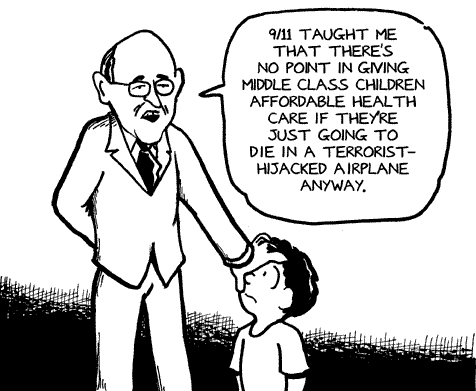The march of history is a liberal plot
 It's always sort of fascinated me, the way conservatives, no matter how many of the levers of power they control, no matter how many things go their way politically, always act as if they're under siege all the time. Like there's a phantom liberal tide always about to sweep them away, however often they win in the short term.
It's always sort of fascinated me, the way conservatives, no matter how many of the levers of power they control, no matter how many things go their way politically, always act as if they're under siege all the time. Like there's a phantom liberal tide always about to sweep them away, however often they win in the short term.It's actually very simple, I think. They're right, and that tide is history itself.
“At every crossroad on the road that leads to the future, each progressive spirit is opposed by a thousand men appointed to guard the past.” So said Maurice Maeterlinck, winner of the 1911 Nobel Prize in Literature (confession: I know nothing about him beyond that quote).
In the past, "conservatives" were people who supported slavery, segregation, gender discrimination, anti-sodomy laws, and opposed any kind of social safety network. Because that's what conservatism is: opposition to progress.
Whereas "liberals" are simply people who see tomorrow's conventional wisdom--of course women should have the vote, of course racial discrimination is wrong, of course gay teachers pose no threat, of course the government can and should guarantee health care for its citizens--a decade or two ahead of the mainstream. Liberals are the early adapters of good ideas.
And I think on some level conservatives know change of certain kinds is inevitable, or at least extraordinarily hard to stop. I think they have a legitimate sense that some aspects of the status quo they strongly support are under attack. I think they misidentify the source--they tend to attribute their sense of being under siege to Muslim hordes who are going to make us live under a "caliphate" (a word most of them just learned and can't properly define).
When in fact, the looming threat they're sensing is the progressive march of history. For-profit health care and insitutionalized antigay bias seem likely to be among its next victims. And they fear they can't stop it.

 From
From  Every so often during a campaign you read something that makes you do a mental double-take. This was the case for me when I saw that Mitt Romney had proposed
Every so often during a campaign you read something that makes you do a mental double-take. This was the case for me when I saw that Mitt Romney had proposed 



